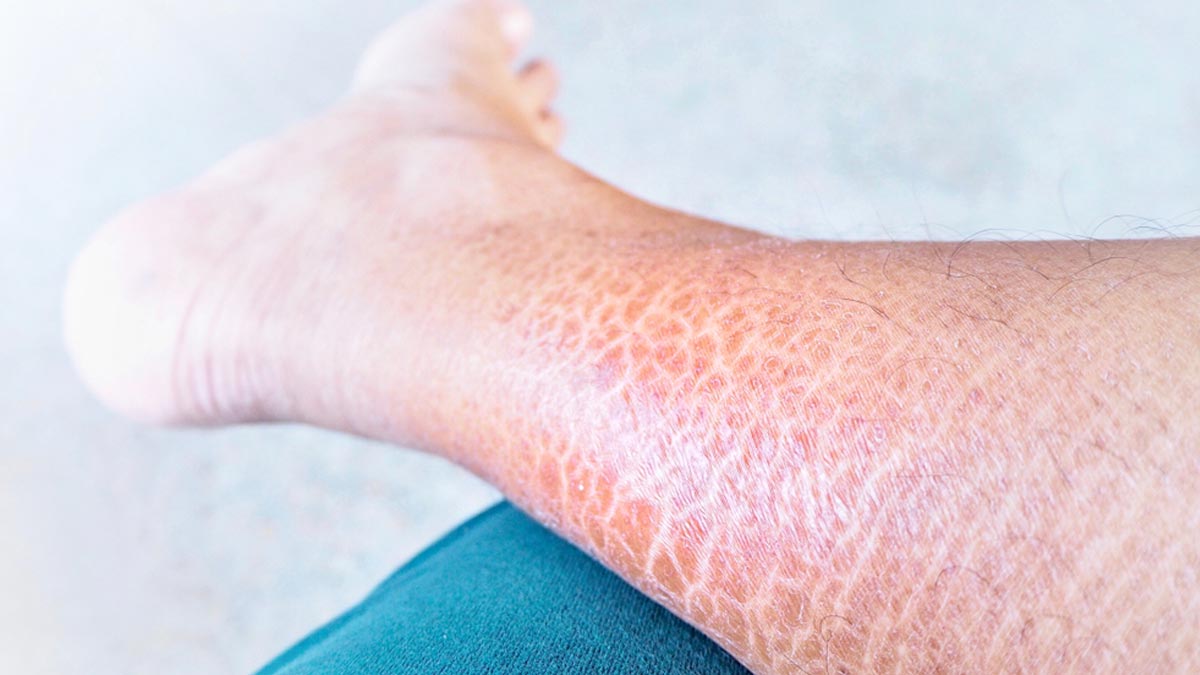
Have you heard about a genetic skin disorder that causes dry, thickened, and flaky skin? This condition known as ichthyosis is derived from the Greek word for fish and presents with scales on the skin that vary in severity from mild aesthetic concerns to life-threatening complications. We spoke to our expert Dr Atula Gupta, Dermatologist, Dermatosurgeon, Paediatric Dermatologist MBBS, MD-Dermatology, Venerology and Leprosy, who explained ichthyosis, its types, and how to manage it.
Table of Content:-

“Ichthyoses are a family of genetic skin disorders occurring because of abnormal skin turnover. There is significant variability in the appearance of different kinds of ichthyotic conditions. Common symptoms of ichthyosis include dry scaly skin, redness, itching, fissures, thick palms and soles and difficulty in maintaining body temperature,” said Dr Gupta.
According to the National Institute of Arthritis and Musculoskeletal and Skin Diseases (NIAMS), many people have a genetic form of ichthyosis caused by a mutated gene, typically inherited from their parents. However, some develop an acquired (nongenetic) form of ichthyosis due to another medical condition or specific medications. Although there is currently no cure for ichthyosis, ongoing research and available treatments can help manage the symptoms.
Major Types of Ichthyosis
1. Ichthyosis Vulgaris

“Ichthyosis vulgaris is the most prevalent type of ichthyosis, linked to mutations in the filaggrin gene. It affects about 1 in 250 people, with symptoms typically appearing in childhood, characterised by fine white scales on the forearms or legs,” added Dr Gupta.
2. X-linked Ichthyosis
X-linked ichthyosis exclusively affects males due to its X-linked recessive pattern. It affects approximately 1 in 6000 individuals due to mutations in the STS gene, leading to a steroid sulfatase deficiency. Dr Gupta added, “The scales associated with this condition are larger, dark brown, and are typically found on the neck, limbs, and trunk. Additionally, this skin condition may be associated with opacities in the cornea. Symptoms can be evident at birth or during infancy.”
Also Read: Carrier Oils: Expert Lists How To Choose And Use These Oils For Your Skin
3. Lamellar Ichthyosis
Lamellar ichthyosis is a severe form and occurs due to autosomal recessive inheritance. The large, dark, plate-like scales can nearly cover the entire body and may also cause severe redness and skin peeling.
4. Congenital Ichthyosiform Erythroderma (CIE)
This variant of ichthyosis is also known as Ichthyosis With Confetti (IWC) or congenital reticular ichthyosiform erythroderma (CRIE), It is present from birth and presents as fine white scales covering the entire body.
5. Harlequin Ichthyosis
“Harlequin ichthyosis is the most severe type of ichthyosis and can be life-threatening for infants. The newborn baby's skin has thick armour-like scales accompanied by deep fissures which may lead to loss of moisture from the skin and severe dehydration. There is a high risk of infection and mortality,” highlighted Dr Gupta.
Current and Emerging Treatments for Ichthyosis
Although there is no cure for ichthyosis, a range of treatment options is available to manage symptoms and enhance the quality of life for those affected by the condition.
Topical Treatments

“Frequent and consistent moisturising is the cornerstone of treating ichthyosis. Moisturisers and emollients work to enhance hydration and repair the skin barrier. Emollients like glycerine maintain hydration by attracting water to the skin. Occlusive moisturisers containing petrolatum or urea prevent water loss from the skin by creating a physical barrier,” said Dr Gupta.
“For thicker scales, keratolytics like alpha and beta hydroxy acids help to remove built-up scales. They act by increasing the shedding of the thickened stratum corneum. Research shows that topical 2-10% salicylic acid improves roughness and scaling in different types of ichthyoses. Topical retinoids like tretinoin and tazarotene have been researched extensively and found to be beneficial in regulating skin cell turnover,” added Dr Gupta.
Also Read: Understanding Skin pH: Expert Explains Importance Of Skin pH And How To Tell If Yours Is Healthy
Systemic Treatments
For severe ichthyosis, oral retinoids help to normalise keratinocyte proliferation leading to decreased scale formation. Oral retinoids like acitretin and isotretinoin have shown efficacy in lamellar ichthyosis. However, oral retinoids should not be administered during pregnancy as they have teratogenic effects. Antibiotics are commonly prescribed to address secondary bacterial infections.
Supportive Measures

“Ichthyosis is a condition with thick scales. Bathing with lukewarm water containing emollients or bath oils helps to facilitate scale removal and skin hydration. Gentle scrubbing with a loofah during baths can further help remove thick scales,” added Dr Gupta. Humidifiers help to maintain moisture and prevent skin dryness, especially during dry winter months. Individuals should wear soft, breathable fabrics to minimise irritation.
Emerging Therapies
Dr Gupta said, “Ongoing research in gene editing technologies shows promise in correcting the underlying genetic defect in ichthyosis. Biologics are active molecules that target inflammatory pathways and skin cell turnover. Several studies are currently exploring the role of biological agents in modulating immune response in severe forms of ichthyosis.”
Bottomline
Dr Gupta concluded, “Ichthyosis includes a diverse group of genetic skin disorders. While it is an incurable skin condition, topical, oral, and supportive therapies have significantly improved symptoms and the quality of life of those suffering. Ichthyosis can negatively impact an individual’s self-esteem because of its persistent and visible nature. It can be beneficial to seek psychological counselling and participate in support groups. Ongoing research into biological drugs and genetic treatments holds promise for a potential cure in future.”
[Disclaimer: This article contains information provided by an expert and is for informational purposes only. Hence, we advise you to consult your own professional if you are dealing with any health issues to avoid complications.]
Also watch this video
How we keep this article up to date:
We work with experts and keep a close eye on the latest in health and wellness. Whenever there is a new research or helpful information, we update our articles with accurate and useful advice.
Current Version